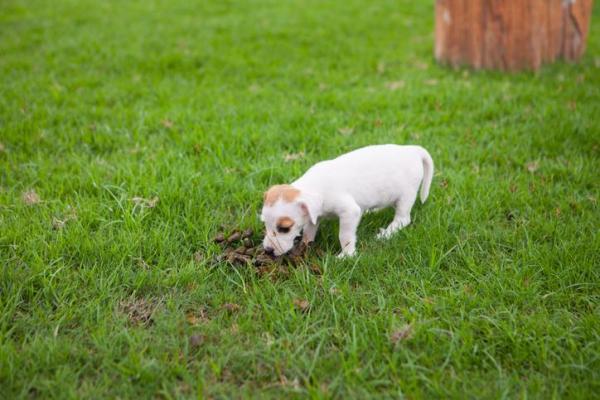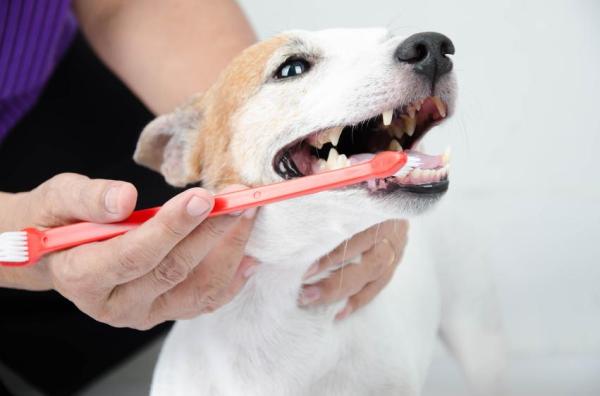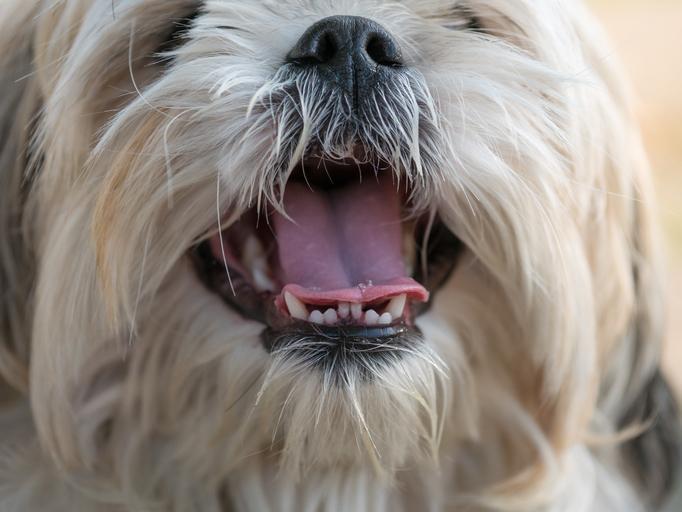Why Does My Dog’s Breath Smell Like Fish?



See files for Dogs
Halitosis or bad breath is a relatively common problem in dogs and can be caused by many different things. It is important to know, that this halitosis is not normal, should not be ignored and requires veterinary treatment. The causes of bad or ‘‘fishy’’ breath can range from dental hygiene problems to systematic diseases or intoxication. In this AnimalWised article we will explain why your dog’s breath smells like fish, and discuss how this can be treated and/or prevented.
Causes of Halitosis in dogs
If your dog ingests excrement (coprophagia) or is experiencing an episode of vomiting, regurgitation or suffering from rhinitis or sinusitis, it is common to notice halitosis. In this case, the reason why your dog’s breath would smell fishy would be due to the bad smell which is tied to the excrement or vomit.
When a dog is suffering from rhinitis or sinusitis; it is the nasal secretion swallowed by the dog which gives off a bad smell. In this case, common symptoms you might notice would be sneezing or malaise, and you should go to the veterinarian to treat this appropriately.
In the case of coprophagy, the causes which encourage it are not very clear. Therefore, we must rather focus on its prevention, as the ingestion of feces from other animals can cause parasitosis. In order to prevent this behavior, we recommend getting in contact with an ethologist or canine behavior specialist. In general, this behavior is more common in puppies.

Rotten fish mouth due to poisoning
The ingestion of compounds such as phosphorus or zinc phosphide may explain why a dog’s breath may smell of rotten fish or garlic. In these cases we may observe other symptoms such as: seizures, diarrhea, breathing difficulties, weakness, pain or vomiting. If you suspect that your dog has been poisoned, you should go to your veterinarian as soon as possible. Prognosis will depend on what was ingested, its quantity and the size of the dog. If possible, we suggest taking a sample of the toxin to your veterinarian to aid with the diagnosis.
As always, prevention is your best option. Do not, under any circumstance, leave anything toxic in reach of your dog. Keep in mind that a lot of human foods are also toxic for our dogs, therefore, stay vigilant!
Diseases that cause bad breath in dogs
Periodontal disease is a main cause of bad smell when it comes to our dogs and their breath. Among the oral disorders that stand out are the following:
Gingivitis
Is the inflammation of the gums which can be very painful. The longer gingivitis is present, the more the gums end up separating from the teeth. Food and bacteria then accumulates in these now open spaces. This accumulation of food or bacteria can end up causing an infection in the gums. With this infection comes a bad smell. And in addition to this halitosis is a reddening, bleeding or oozing of the gums.
Gingivitis requires veterinary attention in order for it not to progress to periodontitis.
Periodontitis
When gingivitis progresses, it infects the roots of the teeth, which results in more severe detachment. This disease causes severe mouth pain. Therefore, in addition to noticing a rotten smell coming from your dog’s mouth, they will also present eating difficulties, the inability to keep food in their mouths and/or hypersensitivity. This infection requires veterinary treatment, which includes: thorough dental cleaning, antibiotics and in more severe cases, tooth removal.
Stomatitis
Is an inflammation in the mouth, lips, gums and tongue. Stomatitis has different causes, such as periodontal diseases, mouth ulcers, presence of foreign bodies or general mouth irritation. This inflammation requires veterinary treatment, as it is a very painful condition that, in addition to bad smell, causes: hypersalivation, eating difficulties, bleeding and difficulty with mouth manipulation. Stomatitis can also appear due to systemic diseases such as diabetes, kidney failure or hypothyroidism, hence the importance of a correct diagnosis.
Strange bodies
Although not a disease in itself, some foods or objects such as chips, bone fragments, hooks or spikes can get trapped in a dog’s mouth and develop some of the aforementioned pathologies. If you notice that your dog:
- scratches its mouth with its feet or rubs itself
- hypersalivates
- appears nausious
- keeps its mouth open
- gives off a bad oral smell
it is very possible that your dog has a foreign body stuck in its mouth or teeth.
We recommend trying to open your dog’s mouth to examine it. You may see the foreign object or food stuck behind its tongue or tooth, especially in the case of ropes which can wound around a tooth’s base. Unless you can see it very clearly and remove it easily, it must be a veterinarian who extracts it. It is also possible that a veterinarian might prescribe an antibiotic to clear any leftover infections.

Tips prevent bad breath in dogs
Now that we have discussed possible reasons of why your dog has bad breath, we can take a look at some recommendations regarding oral hygiene. Caring properly for your dog’s teeth can prevent the onset of gingivitis or periodontitis. Here are some tips to follow :
- Adequate food: we recommended feed or food that promotes biting and gnawing. This food helps keep teeth clean as biting and gnawing simulates a form of brushing.
- Periodic oral cleaning: on the market there are toothbrushes and dog-specific toothpastes. We suggest accustoming your dog to frequent brushing, which will also help you detect any oral problem in its initial phases.
- Use of teethers: following veterinarian recommendation, you can make or buy toys which are suitable for the maintenance of a dog's dental health. A professional can also recommend what to avoid so as not to damage teeth, such as tennis balls, because of its abrasive effect.
- Snacks: also following the veterinary advice, you can periodically offer your dog snacks that favor dental hygiene. However, this snack giving needs to be rationed in order to avoid obesity. .
- Professional dental hygiene: if your dog’s mouth is in poor condition you can resort to professional dental cleaning performed by a veterinarian. This procedure will require anesthesia, therefore it is important to monitor our dog’s dental hygiene and not let it worsen. If you wait until your dog is very old, anesthesia may pose a considerable risk.
It is also important to remember that smaller dogs are prone to oral problems, therefore if you have a small dog, or any dog for that matter, we suggest paying greater attention to their dental hygiene,

Other causes that cause fish breath in dogs
Lastly, it is very important to state that sometimes a dog has bad breath due to diseases, specifically diabetes or kidney failure. In these cases you will most likely notice other symptoms such as an increase in water intake and urine elimination, known as polydipsia and polyuria.
In the initial phases of diabetes, you will notice your dog eat a lot more than usual without any signs of weight gain. It is when the disease progresses that you can notice:
- vomiting
- lethargy
- anorexia
- dehydration
- weakness
- cataracts
There may also be a strange odor in the breath in cases of diabetic ketoacidosis, which occurs when lipids are metabolized for energy, in the absence of glucose. This procedure causes ketones that accumulate in the blood, leading to other symptoms such as weakness, vomiting or breathing problems. If you notice any of these symptoms in your animal we recommend going to your veterinarian as soon as possible.
In the case of renal failure it is possible that a dog also presents symptoms of: vomiting, dehydration, apathy, anorexia, thinning or mouth ulcers. This disease can present itself as acute or chronic. In both cases you will notice halitosis. In case of any of these symptoms, it will be a veterinarian who, through blood tests, will determine if a dog is suffering from any of these diseases. A veterinarian will also be able to prescribe appropriate treatment.
This article is purely informative. AnimalWised does not have the authority to prescribe any veterinary treatment or create a diagnosis. We invite you to take your pet to the veterinarian if they are suffering from any condition or pain.
If you want to read similar articles to Why Does My Dog’s Breath Smell Like Fish?, we recommend you visit our Other health problems category.








